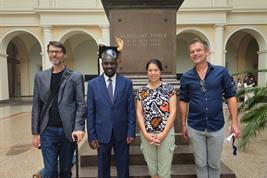11.09.2024

On 03.09.2024, Harison Kipkulei successfully defended his PhD project with the title, “Maize condition monitoring and yield prediction in Kenyan agricultural landscapes: A remote sensing and crop modelling integration approach.”
The doctoral committee was headed by Prof Dr. Dr. Christian Ulrichs (Professor of Urban Plant Ecophysiology at Humboldt-Universität zu Berlin).
During his PhD, Mr. Kipkulei was supervised by Prof. Dr. rer. agr. Stefan Sieber (Head of the working group “Sustainable Land Use in Developing Countries” at ZALF), Prof. Dr. rer. agr. Sonoko Dorothea Bellingrath-Kimura (Professor of Land Use Systems at the Humboldt-Universität zu Berlin and Co-Head of Research Area 2 “Land use and governance” at ZALF), Assoc. Prof. Marcos Lana (Swedish University of Agricultural Sciences, Uppsala, Sweden), and Dr. Mark Kipkurwa Boitt (Senior Lecturer & director at the Institute of Geomatics, GIS & Remote Sensing at Dedan Kimathi University of Technology, Kenya).
The PhD project focused on the development of an integration approach that combines crop modelling and remote sensing to assess maize crop conditions and quantify production in Kenyan agricultural landscapes. The project integrated datasets from on-farm experiments, remote sensing, climate modelling, GIS and remote sensing analysis to develop innovative approaches for addressing data limitations in data-scarce environments. He conducted process-based model calibration and evaluation using multi-season data and conducted muti-year yield simulations to assess yield stability at spatial explicit levels. The doctoral project also assessed the yield response of various agronomic measures at agroecological levels to promote optimal targeting of measures for enhanced production. The project further tested the performance of remote sensing and crop modelling integration at the field and regional scales by driving crop model simulations using remotely sensed data. In the cumulative work published in five peer-reviewed articles, Mr. Kipkulei demonstrated that crop modelling and remote sensing integration offered promising avenues for the evaluation of crop conditions and development in data-scarce landscapes. The spatial-explicit assessment of agronomic practices revealed significant influences of agronomic measures, with their potential to enhance production by adopting approaches such as shifting sowing dates and a specific cultivar.
The doctoral committee rated the PhD with an overall grade of magna cum laude.
We congratulate Mr Kipkulei!!
